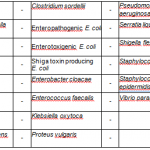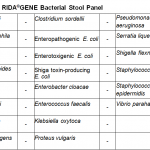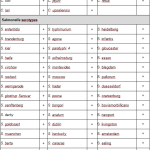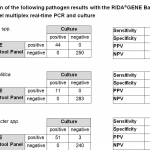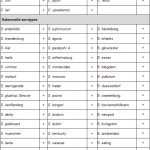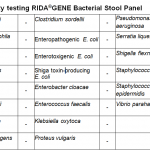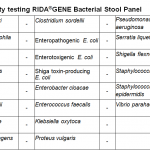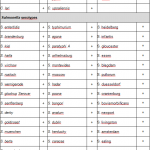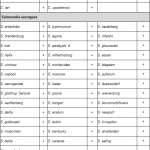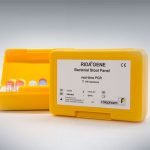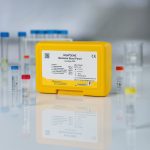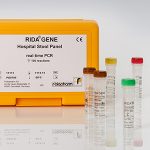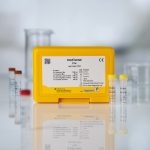Intended use:
For in vitro diagnostic use. RIDA®GENE Bacterial Stool Panel is a multiplex real-time PCR for the direct, qualitative detection and differentiation of Campylobacter spp. (C. coli, C. lari, C. jejuni), Salmonella spp. and Yersinia enterocolitica in human stool samples.
The RIDA®GENE Bacterial Stool Panel multiplex real-time PCR is intended for use as an aid in diagnosis of gastrointestinal infections caused by bacteria.
General information:
Diarrheal disease is a major health care problem and causes about 2 billion cases worldwide. The World Health Organization (WHO) ranks diarrheal disease as 2nd most common cause of child deaths among children under 5 years globally, particularly in developing countries.
Campylobacter species are one of the most common causes of bacterial diarrhea worldwide, responsible for 400 million – 500 million cases annually. The disease caused by the genus Campylobacter is called campylobacteriosis. More than 80 % of Campylobacter infections are caused by C. jejuni. The Centers for Disease Control and Prevention (CDC) estimates more than 2 million cases of campylobacteriosis each year in the US. The Foodborne Diseases Active Surveillance Network (FoodNet) reported an incidence rate of 13 cases per 100,000 population in 2008. C. jejuni was detected in 5 – 16% of children with diarrhea in developed countries and in 8 – 45% of children with diarrhea in developing countries. Approximately 100 persons with Campylobacter infections die each year in the US. Infection with Campylobacter occurs through contaminated food, especially poultry, water, contact with infected animals or by fecal-oral route, particularly in children.
Salmonella species are also a leading cause of bacterial gastroenteritis worldwide. The genus Salmonella is divided into two species, S. enterica and S. bongori. So far, more than 2,500 Salmonella serotpyes are described which are pathogenic for humans. Salmonella species are causing nontyphoidal salmonellosis or typhoid fever. It is estimated that 93.8 million cases of nontyphoidal salmonellosis infections with 155,000 deaths occuring globally each year. The CDC estimates more than 1.2 million cased of nontyphoidal salmonellosis infections each year in the United States, with more than 23,000 hospitalizations and 450 deaths. Most of the nontyphoidal salmonellosis infections are caused by the S. typhimurium and S. enteritidis, while typhoid fever is caused by S. typhi and S. paratyphi A, B or C. The CDC estimates more than 1,800 cases of typhoid fever annually in the U.S. Transmission of Salmonella occurs through contaminated food, water or contact with infected animals.
Yersinia enterocolitica is one of three Yersinia species (Y. pestis, Y. pseudotuberculosis) of the genus Yersinia that are pathogenic for humans and cause of the gastrointestinal disease called Yersiniosis. According to FoodNet an incidence rate of 1 Y. enterocolitica infection per 100,000 persons occurs each year in the U.S. The European Centre for Disease Prevention and Control reported 8,874 cases in 2007, of which about 5000 cases were from Germany. Infection with Yersiniosis occurs after ingestion of contaminated food or water.
RIDA®GENE Bacterial Stool Panel multiplex real-time PCR is a new and attractive alternative method for testing stool samples and has proven to be highly sensitive and specific for the simultaneous detection of three of the most important diarrhea causing bacteria (Campylobacter spp., Salmonella spp. and Y. enterocolitica).
Image Gallery
| Art. No. | PG2405 |
|---|---|
| Test format | real-time PCR with 100 reactions |
| Shelf life | 24 month after production |
| Sensitivity | Analytical Sensitivity : ≤ 10 DNA copies per reaction |
Dear customers,
we have started to provide the documents for our products in an electronic format. These are the Instructions for Use (IFU), the Safety Data Sheets (SDS) and the Certificate of Analysis (CoA). For batches placed on the market after 01 January 2023, you can find our documents on the eIFU portal eifu.r-biopharm.com/clinic.








